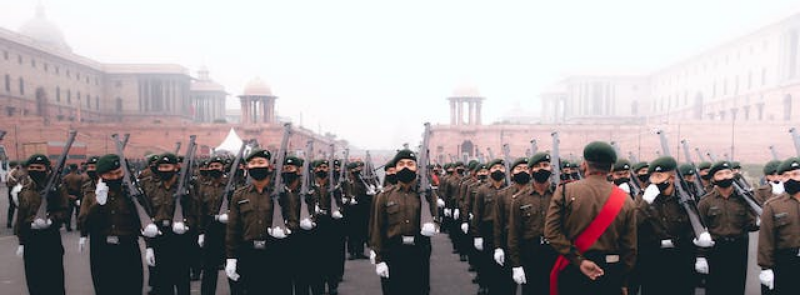
When It Occurs
Every January 26th
Timeline
Days Passed (1123)
# Hashtags
#RepublicDay #IndianConstitution
Republic Day in India, observed on January 26th each year, is celebrated with immense zeal and enthusiasm. The day is marked by spectacular parades held at Janpath, New Delhi, showcasing the Indian National Army and various cultural displays. Across the nation, flag hoisting ceremonies take place in multiple locations, signifying patriotism and the country's rich cultural heritage. It's a day filled with pride, honoring India's constitution and its diverse history.
Historical Background
-
Independence from British Rule: India gained independence from British rule on August 15, 1947. However, it continued to be governed under the colonial Government of India Act, 1935. The leaders of India wanted to draft their own Constitution and establish India as a republic.
-
Drafting of the Constitution: A Constituent Assembly was formed in 1946, which worked to draft a new Constitution for independent India. The drafting committee, chaired by Dr. B.R. Ambedkar, worked extensively on this task.
-
Adoption of the Constitution: The Constitution of India was adopted by the Constituent Assembly on November 26, 1949, and it came into effect on January 26, 1950. The date of January 26 was chosen to honor the memory of the Purna Swaraj (complete independence) declaration of 1930, made by the Indian National Congress in opposition to British rule.
-
First Republic Day: On January 26, 1950, Dr. Rajendra Prasad took the oath as the first President of India, marking the birth of the Republic of India. Since then, this day is celebrated every year as Republic Day.
Significance of Republic Day
-
Constitution Came into Force: Republic Day marks the day when India’s Constitution came into effect, providing the country with its framework of governance, rights, and duties.
-
Establishment of a Republic: On this day, India formally became a Republic, with a President as its head of state, replacing the British monarch as the nominal head of India.
-
Democratic Ideals: Republic Day celebrates India’s democratic ideals. The Constitution grants fundamental rights to citizens and defines the functioning of the government, making it a day to celebrate democracy and the rule of law.
National Celebrations
Republic Day is celebrated with grandeur across the country, with the main celebrations taking place in the national capital, New Delhi. The events are attended by the President of India, other dignitaries, and thousands of citizens.
-
Republic Day Parade:
- The Republic Day Parade in New Delhi is the highlight of the celebrations. It takes place on Rajpath, stretching from Rashtrapati Bhavan to India Gate.
- The parade showcases India’s military strength, cultural diversity, and achievements in various fields such as technology and innovation.
- The Indian Armed Forces—the Army, Navy, and Air Force—conduct spectacular displays, including march-pasts, military equipment exhibitions, and aerial fly-pasts.
- The parade also features performances from various Indian states, representing the rich cultural heritage of the country through tableaux, dances, and songs.
-
President’s Role:
- The President of India plays a significant role on Republic Day. As the Commander-in-Chief of the Armed Forces, the President receives the Salute at the Republic Day Parade.
- On the eve of Republic Day, the President addresses the nation in a broadcast that highlights the nation’s progress and challenges.
-
Chief Guest:
- Every year, a foreign dignitary is invited as the chief guest for the Republic Day celebrations. This reflects India's diplomatic relations and friendship with the guest nation.
-
Gallantry Awards:
- On Republic Day, gallantry awards such as the Param Vir Chakra, Ashoka Chakra, and Vir Chakra are given to brave soldiers, and civilians are honored with awards for their achievements and contributions to the country.
-
Beating Retreat Ceremony:
- The Republic Day celebrations officially conclude on January 29th with the Beating Retreat Ceremony, which takes place at Vijay Chowk in New Delhi. It involves musical performances by the bands of the armed forces and marks the end of Republic Day festivities.
Celebrations Across India
-
State-Level Celebrations: In addition to the grand celebration in New Delhi, Republic Day is also celebrated in all Indian states and Union Territories with similar enthusiasm. Governors preside over state-level parades and events, and schools and organizations hold cultural programs, hoist the national flag, and sing patriotic songs.
-
School and College Functions: Republic Day is widely celebrated in educational institutions across India. Schools and colleges organize flag-hoisting ceremonies, parades, cultural programs, and speeches that emphasize national pride and patriotism. Children participate in march-pasts, dance performances, and quizzes based on India’s Constitution and history.
Symbolism and Patriotism
-
The National Flag: The tricolor Indian national flag is hoisted across the country, symbolizing India’s pride, unity, and independence. The flag is a key symbol during the Republic Day celebrations, and its hoisting is accompanied by the singing of the national anthem, "Jana Gana Mana."
-
The National Anthem: The national anthem is sung at various events, instilling a sense of unity and patriotism among the citizens. It serves as a reminder of the sacrifices made by freedom fighters and the values enshrined in the Constitution.
Importance of Republic Day Today
Republic Day continues to hold immense importance in contemporary India, as it serves as a reminder of the country's democratic values and constitutional rights. It promotes unity, regardless of caste, religion, or region, and is an occasion to reflect on India's achievements and the path ahead.
Conclusion
Republic Day is a day of national pride and patriotism in India. It celebrates the adoption of the Constitution and India’s transition to a republic, reinforcing the values of democracy, justice, and equality that the country holds dear. The grand parade, the display of military might, cultural diversity, and the patriotic spirit that it evokes make Republic Day one of the most significant national celebrations in India.


